Dr Ang Swee Chai grew up supporting Israel. Arabs, she was told, were terrorists. But in 1982, on the television she saw the relentless bombing of Beirut by Israeli planes. Shocked, her view of Israel began to change. It was then that she heard of an international appeal for an orthopaedic surgeon to treat war victims in Beirut. The petit woman - she was just under 1.5 meters - resigned her job in London, bade her husband farewell and set out on a journey to civil war Beirut, there she was to eye-witness the Sabra-Shatila massacres*.
With her husband Francis Khoo, and some friends, Dr Ang Swee Chai helped to form the British charity, Medical Aid for Palestinians (MAP), following the 1982 Sabra-Shatila massacres. In 1987, PLO chairman Yasser Arafat awarded Dr Ang Swee Chai the "Star of Palestine" the highest award for service to the Palestinian people.
In her talk, given at a West London Mosque on 10th December 2004, she shares with us some of her experiences of Lebanon and Palestine. Many of the slides she uses in her talk are reproduced below with relevant captions and a time code so that you may follow the slides with the audio.
We thank Dr Ang Swee Chai for her talk, all slides are copyright Dr Ang Swee Chai as are the extracts we have quoted from her book 'From Beirut To Jerusalem', we also like to thank Mehfil-E-Ali for their help. Any additional images used that were not part of the original presentation are marked [+] . Any additional reporting is ours and we alone are responsible for it.
* Sabra-Shatila Massacre: In September 1982, just a few weeks after the Palestinian men had surrendered their weapons under an internationally brokered peace deal, and were deported from Beirut leaving their families under the protection of an international peace keeping force, the Israeli army invaded Beirut, violating the peace treaty, and some 3000 defenceless Palestinian women and children were rounded up in the refugee camps of Sabra and Shatila and systematically murdered in cold blood. (For a repeat of this tragedy see Srebrenica in 1995 - only that time it was 8000 Muslim men who were slaughtered after they had handed their weapons to the UN forces who had guaranteed them a "safe haven").
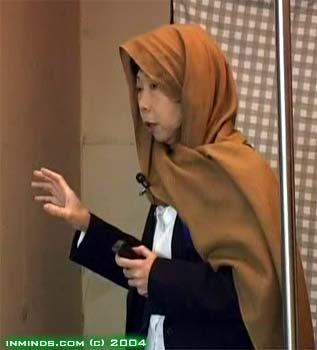
[3:20] I've called it "From Beirut to Jerusalem" because within my own heart I share this fervent wish that one day the Palestinians will be able to return from the refugee camps in Lebanon, that my friends can go back to al-Aqsa and pray as their forefathers had. Its something they all want to do but they can't do now.
The Siege
The 1982 Israeli invasion of Lebanon killed over 30,000 civilians. The siege of Beirut lasted for 70 days, Beirut was subjected a relentless barrage of air, naval, and artillery bombardment. The Israeli bombardment was random and indiscriminate. Food, electricity and water supplies were cut off - over 500,000 people were driven from their homes. The IDF calculated that they had used some 960 tons of ammunition in trying to destroy the city.
The price asked by Israel to stop the destruction of Beirut was for the 14,000 PLO fighters to abandon the city - leaving behind their families. The US brokered peace deal guaranteed the safety of the Palestinians left behind in the camps - a multinational peacekeeping force would be deployed to protect them.
The US didn't honour its word and three weeks after the PLO evacuation they withdrew the multinational force giving the green light to Israel to invade West Beirut and massacre the Palestinians in the camps.
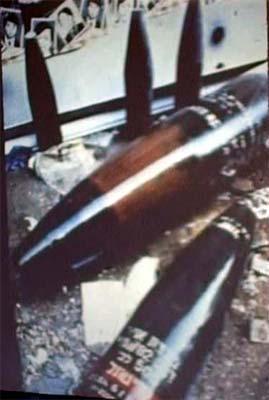
[6:30] As you can see these were some of the bombs that Israel had - killing many people
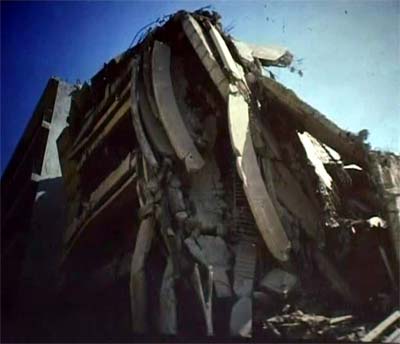
[7:40] Finally the cease-fire came and we were able to make our way across the green-line in to West Beirut. This was the Beirut I new - the Beirut for weeks before I'd watched on television - blocks and blocks of buildings being bombed out and destroyed - only this time it was real, life sized, 3 dimensional and frightening
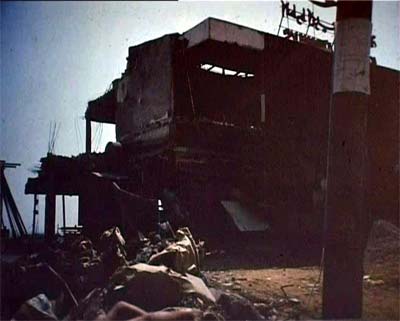
[8:10] The coast line of the beautiful city of Beirut - also known as the pearl of the Middle-East - was shelled by Israeli gun boats and reduced to wreckage.
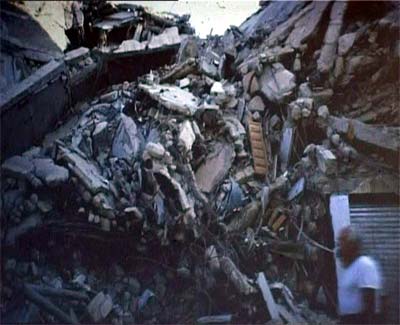
[8:20] But more frightening are the number of new weapons they tested in Lebanon - that time it was the first time Israel exploded phosphorous bombs. So that when phosphorus hits someone it just burns for days and days and then if you wash it - it will burn even more, and the victims just died of phosphorus burns. But this is a different kind - this is called a vacuum bomb. What would happen is that the bomb would go in to a centre, build up very high TNT value, and suck the whole building down - this is an 11 floor building that was sucked in to a heap of rubble, buried within it are 200 people. When I arrived and saw this for myself I know that a doctor can't do much - it is a very humbling experience... I could do nothing to help those people who were buried and killed in this one single bomb attack.
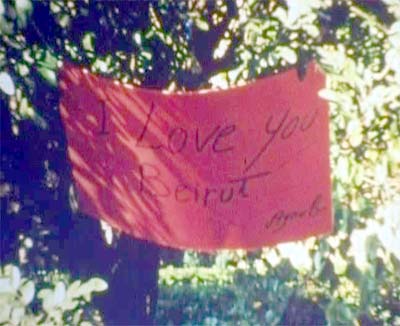
[10:40] Farewell message left by a Palestinian forced to evacuate Beirut... 14,000 Palestinians [men] were forced to leave Lebanon within the evacuation which means that 14,000 families have been broken up, because each family have given up their men - either a father or an eldest son or somebody important, leaving behind women with young children and old people with no men to look after them. In a middle-eastern culture this is a catastrophe. You can image 14,000 families and from these families you take the oldest son out, you take the father - force them to leave and never to come back. That was the price Israel demanded from the PLO in order to stop the bombing.
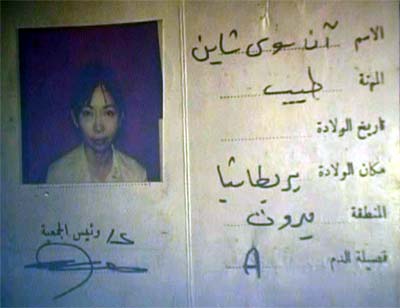
[12:40] I was seconded by the International Red Cross to join a group called the Palestinian Red Crescent Society - this was quite a culture shock to me because I am joining a Red Crescent - a Muslim organisation - but it was the beginning of a road, the beginning of a journey, beginning of a way where I learnt.. and that is my [Red Crescent] ID Card which I cherish...
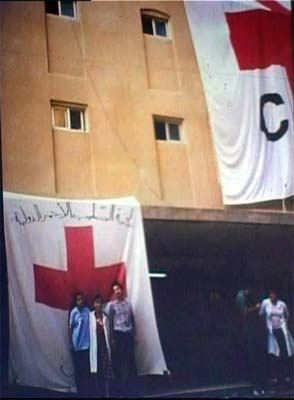
[13:15] Gaza Hospital in Beirut, inside the Sabra-Shatila refugee camp
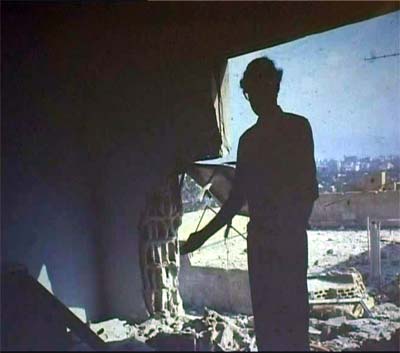
[15:00] Gaza Hospital was protected by the International Red Cross, despite that Gaza Hospital has been bombed - it was 11 floors high and the top 2 floors were blown off, the doctors quarters were shelled..
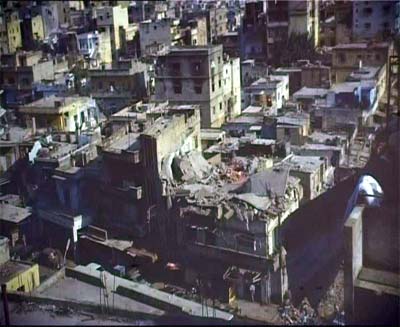
[15:25] Photo from 6th floor of Gaza Hospital. At the time the Palestine Red Crescent Society ran 13 clinics and 9 hospitals - and the Israelis had selectively bombed and destroyed every single one of the clinics and hospitals - killing patients and killing doctors...
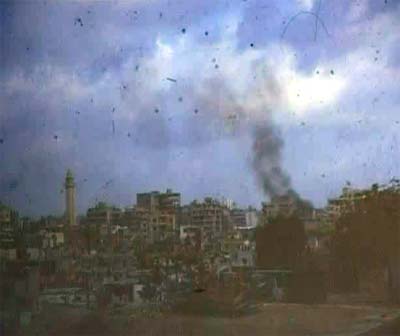
[20:30] There was 3 weeks of peace [following the PLO evacuation], then suddenly on the 15th of September something horrible happened - the international peace keeping force decided to withdraw... and israeli planes flew in and 500-600 Israeli tanks started to roll in to Beirut city [violating the peace treaty]. Before this Beirut city was surrounded by Israeli tanks but never invaded like that - the Israelis had bombed Beirut from the air and seiged the city and denied water and medicine to the people, but this time the tanks are comming - and you can see the tank shelling. [photo] You can see the Mosque in south Beirut - that was the first shell that fell - it was from an Israeli tank. They began to surround the refugee camps in all directions. By about mid-day there was streams of shell smoke comming from everywhere and everybody was very frightened knowing that something horrible is going to happen...
At 4:30pm news arrived at the Gaza Hospital that Israeli troops had invaded Akka Hospital [just outside the camp], nurses had been raped and killed, doctors and patients shot dead.
Extract from p55 & p79 of the book "From Beirut To Jerusalem"
The Massacre
The phalange militia were Israel's proxy in Lebanon, their members were recruited from the Maronite Christian community. They were payed for, trained and armed by Israel. They were effectively an extension of the IDF, and were usually sent in to do the dirty work.
After Sharon's army had taken West Beirut and sealed off all escapes routes from the Palestinian refugee camps, Sharon ordered the phalange in. The official order from Sharon read "for the operation in the camps the phalange should be sent in"*. Knowing that the camps were full of unarmed civilians - mainly women and children, only around 150 phalange were deployed. The testimonies of the survivors suggest that both Israeli soldiers and their mercenaries the Phalange entered the camps and participated in the massacre**.
The Israelis supervised the operation from their forward command post, a six story building overlooking the camps. From there they gave logistic support and relayed orders to the soldiers on the ground. Concerned that reports of the on-going slaughter would leak out, the soldiers were ordered to continue the killing through out the night - to facilitate this the Israelis lit up the sky with flares all night long. The idea was to kill as many Palestinians as quickly as possible, before international pressure would put a stop to the operation. Over 3000 elderly men, women and children were murdered. Next the evidence had to be buried quickly - so the Israelis send in bulldozers. Houses were packed with bodies and demolished to form mass graves. One such mass grave contained a thousand bodies.
*see BBC Panorama "The Accused" 2001.
** Survivors interviewd on 22 Sep reported that many of the soldiers who did the killing did not speak Arabic and Israeli newspapers (in Hebrew) and Israeli food rations were found left behind. A young boy, Munir, who was left for dead under a heap of 27 bodies confirmed that he has seen both Israelis and Phalange murdering people, when he was brought to Gaza Hospital on 17 Sept. (Src: 'From Beirut To Jerusalem' pgs 61, 69 & 71)
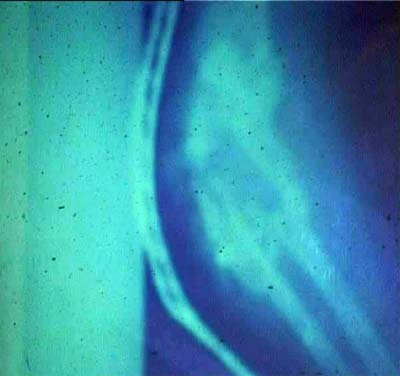
[22:20] The next morning, early in the morning after prayer time, women went to the well and water points to get water for the family and right there they were shot, some of them killed. [photo] This was the first lady that came in, with her elbow blown off, this was her x-ray.
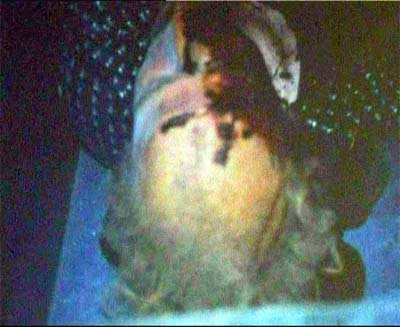
[22:40] And following her a lot of people were shot in their homes and they were brought in to the hospital - many of them died in the mortuary. By no means were they terrorists - [photo] this was an old man that lived next to the hospital - I knew him very well - they killed him.
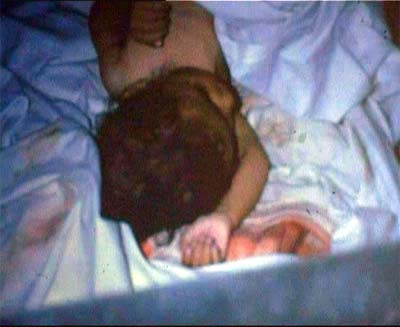
[23:00] Young children like that [photo] were dying [shot] for no reason
Giving Life
In the theatre, I operated on a woman and a child. The woman had major surgery for a gunshot wound of the abdomen. It was a difficult operation, as I had to remove a third of her liver, and anastomose - or join together - transected large and small bowels. She was waking up from the anaesthetic, when the child was brought back from the theatre recovery room. i nipped back in to see both of them and remind the nurses in intensive care to give both of them blood transfusions. I was told that the packet of blood being transfused into the woman was the last one. The child had been wounded by a hand grenade chucked into the midst of a group of little kids. He had lost a fair amount of blood through a severed splenic artery, but otherwise he was stable after his operation. Both needed blood and they were of the same blood group. The Palestinian woman overheard the nurses talking to me and asked us to give blood to the child instead of her. Then she asked for some painkillers and died shortly afterwards.
Extract from p61 of the book "From Beirut To Jerusalem"
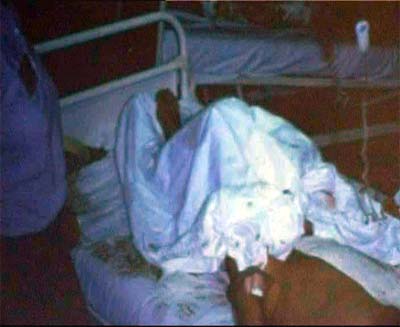
[23:05] My own nurses were also shot, and by evening the next day the whole hospital was teaming with people - about 3000 people - fleeing in to the hospital saying that gunmen had broken in to the homes of the people in the camps and started shooting whole families. They were very very frightened, they were hoping that by staying in the hospital somehow because of the foreign doctors and the International Red Cross observer status that they would be protected - but that was not true of course...
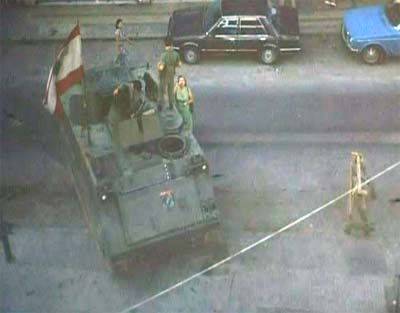
[24:30] On 18th September [72 hours in to the killing] a tank came in and ordered all foreigners out of the hospital at gun point. That was the time when we were very worried because we thought that if we are gone they will probably come in and kill our patients. But at the same time you can not argue with a machine gun and we were just forced out. And as I came out of the hospital I saw groups of women and men and children all rounded up by soldiers and while I was passing them one woman tried to give me her baby but that was not allowed and she was forced to take the baby back, and I fear the worst because for many days afterwards I came back looking for the mother and child - I couldn't find any of them.
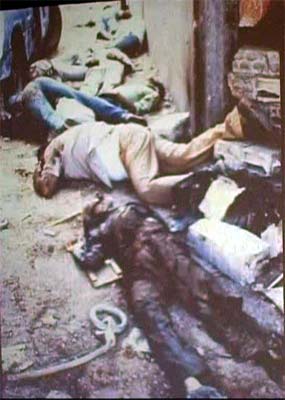
[25:30] For the first time we were out from the basement operating theatre and we can see what has happened - whilst we were operating, trying to save a few lives, the people of the camps were massacred - killed - their bodies left rotting.
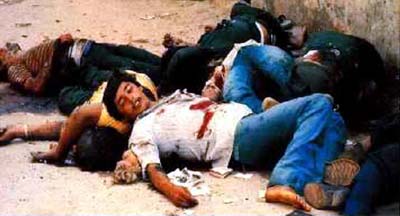 [+]
[+]
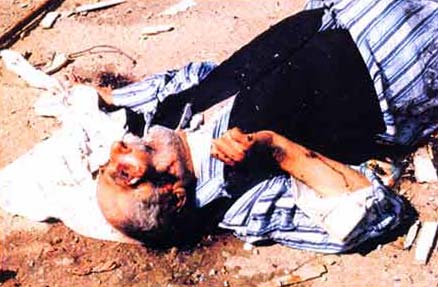 [+]
[+]
Old man tortured - eyes gouged out - before being murdered
To Kill Not Enough
The truth hit me painfully...Besides being shot dead, people were tortured before being killed. They were beaten brutally, electric wires were tied round limbs, eyes were dug out, women were raped, often more than once, children were dynamited alive. Looking at all the broken bodies, I began to think that those who had died quickly were the lucky ones.
Extract from p67 of the book "From Beirut To Jerusalem".
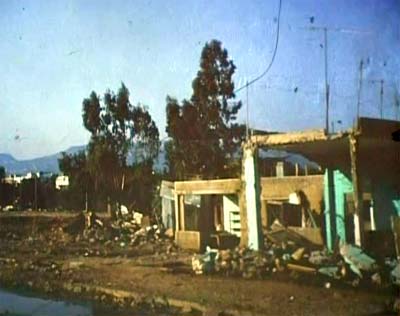
[26:45] The homes people had come to rebuild were destroyed - if you look at these houses you will find that the paint is still fresh - its just painted and probably not even dried. And if you go beyond the broken walls you find the families were broken - there was no one left - food was half eaten - furniture half smashed - the people gone - buried in mass graves.
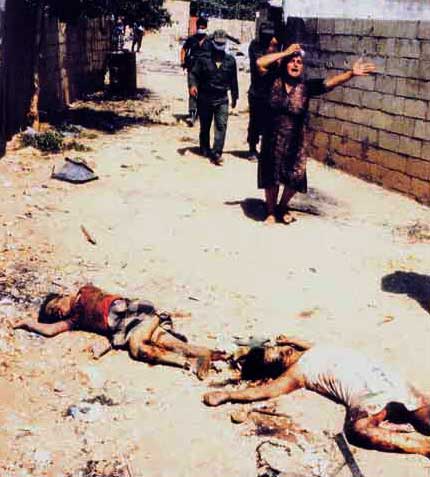 [+]
[+]
A mothers agony - her children slaughtered mercilessly
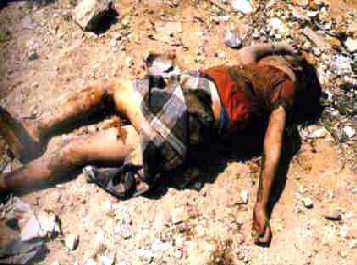 [+]
[+]
For what crime was this child murdered?
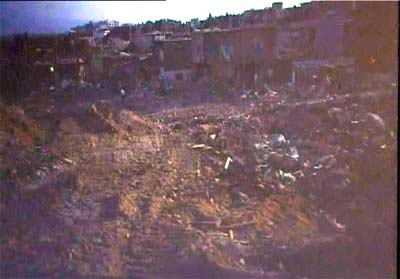
[27:20] These are mass graves. You can see the tank tracks - they have just dug up shallow graves and buried all the bodies in the rubble. They have just bulldozed all the houses - actually if you have been watching the television its very much like Jenin [below] recently in Palestine, but on a bigger scale. About 3000 people were killed in those three days, and in this mass grave alone 1000 bodies were buried there.
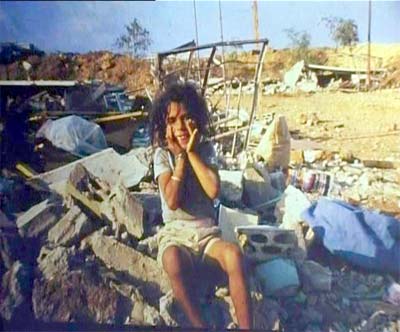
[28:35] Children without homes - there is no where to go for the coming winter
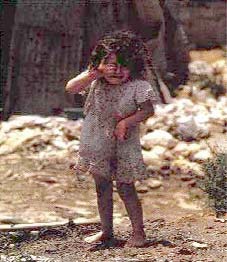 [+]
[+]
The "lucky" survivors - now homeless orphans
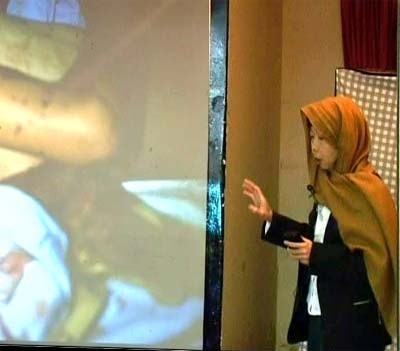
[28:45] I want to talk to you about this family because it is such a typical and yet painful event. This family was from a village near Jerusalem. Their village is completely gone - it doesn't exist anymore - when Israel was formed they found themselves in South Lebanon. South Lebanon was bombed, so the family found themselves in another refugee camp called Tel al-Zaatar in east Beirut. In 1978 Tel al-Zaatar was massacred -3000 people died. So this family escaped from Tel al-Zaatar and found themselves in Shatila camp. When the evacuation took place the family had enough - they said they were going to stay, so they stayed in Shatila camp. And the massacre came, and of the whole family 27 members were killed!
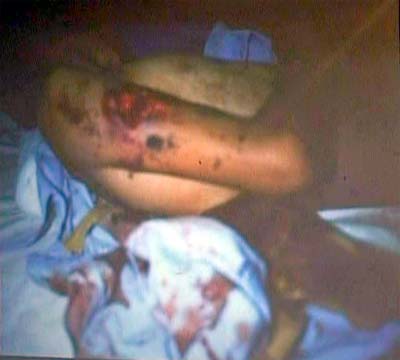
[30:10] This is Munir, at the time Munir was only 9 years old. Munir was shot 3 times together with 27 members of his family. And as the dead bodies fell on him, he fainted - which was a good thing because the gunmen thought he had died and left him alone. After they left his friends came and took him to the hospital.
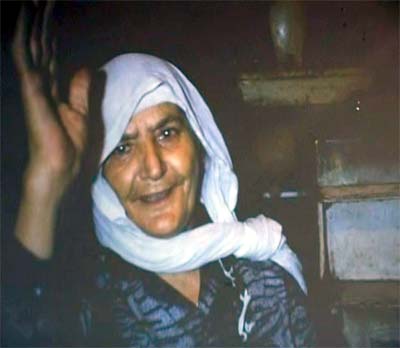
[30:50] I visited Munir's grandmother Hajjar. His grandmother at the time was in South Lebanon and when she heard that there was a massacre in Shatila the 72 year old lady was very worried so she walked 20 kilometres - all the way from South Lebanon to Shatila camp. And when she arrived she knew her family was gone. Hajjar was mourning for her family but I went in to her house because she's Munir's grandmother and I asked her what have you to say Hajjar? Then she broke out and told me all this in arabic:
Whats there left to say? There is nothing left to say.
Our flowers still blosom and our oranges give fragrance,
our sparrows sing their usual songs,
yet my children are no where to be found.
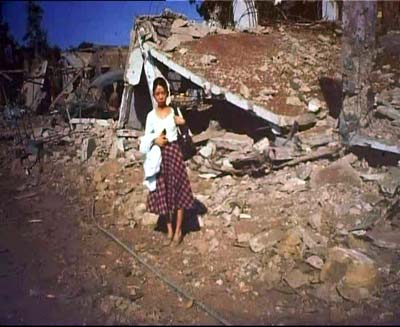
Beirut - you took all I had,
and you took my last important life,
my heart lies dead on your streets.
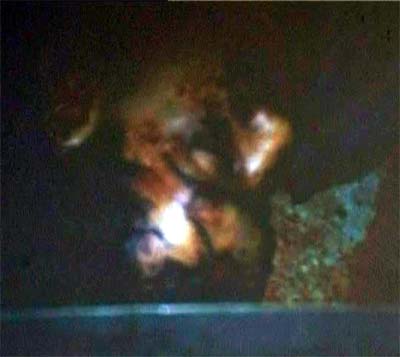
Abu Zuhair, my fine young son
was cruelly cut off from his roots on your soil.
Abu Zuhair - you who found your way from Tel al-Zaatar
with a Kalashnikov in your hand, to meet me Shatila,
how come you are slaughtered like a sheep?
What have I got to say?
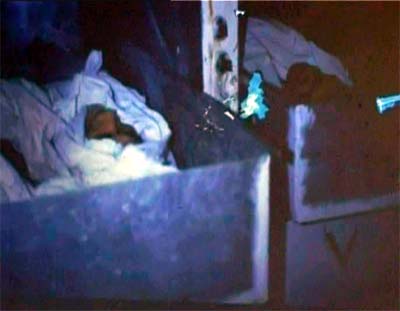
Crow of ill-omen - please,
who told you of my where abouts?
Bearers of coffins, please move slowly
so that I can see my loved ones once again
Oh God! Please wait, just wait and Your will be done.
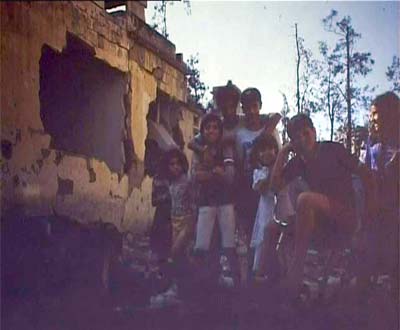
How I envy those of you who were around when my children died. Did you let them die thirsty?
Or were you kind enough to give then a drink?
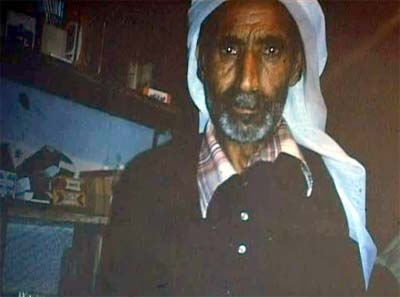
Life - what life is like to us?
Our hearts have died and our tears have dried
for all the men and women who fell.
God All Mighty give us patience,
and our children - may our love be a lantern to Your path
and may God show me the holy way
Doctor, please go away -
you have reopened all our wounds,
we are so weary, what is there to say?
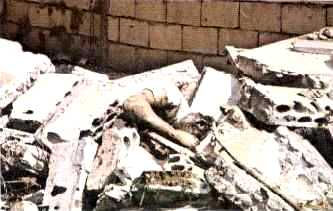 [+]
[+][+]
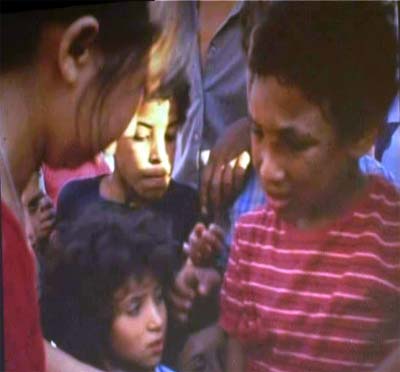
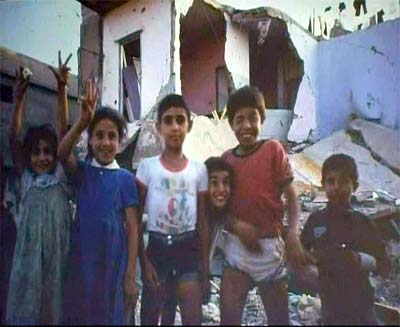
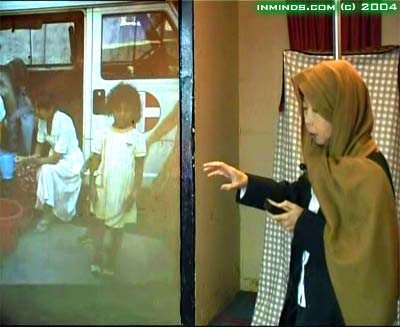
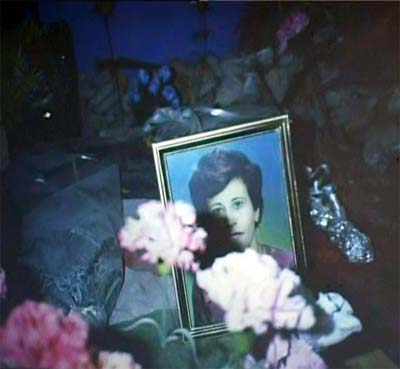
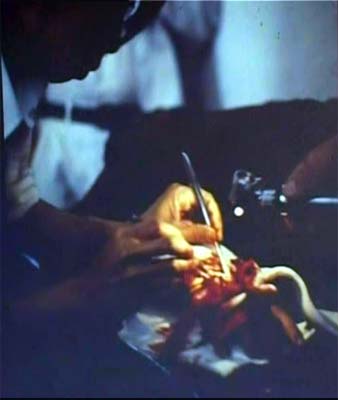
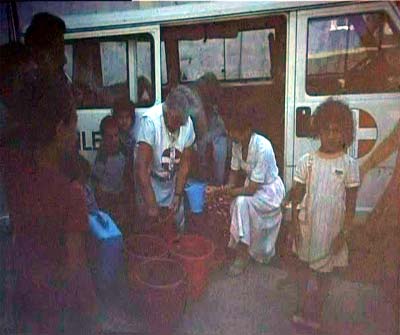

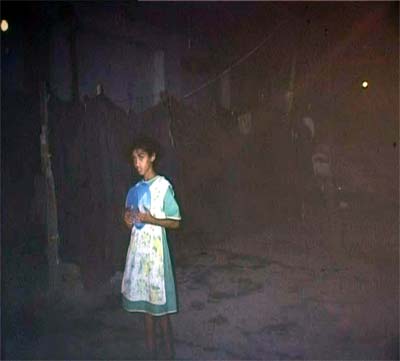
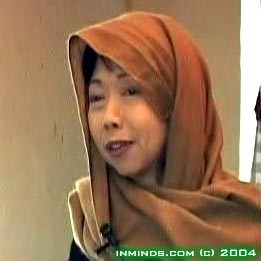

















 [+]
[+] [+]
[+]
 [+]
[+] [+]
[+]

 [+]
[+]






